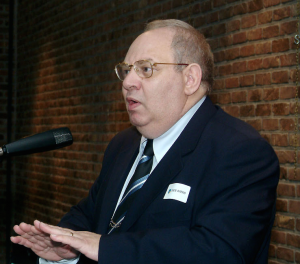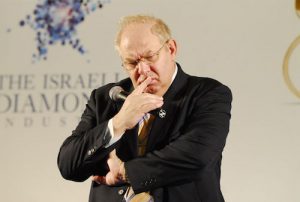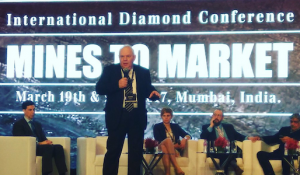
This week, Chaim Even-Zohar, my longtime friend, colleague, and onetime mentor, announced he was retiring after nearly 40 years of diamond industry journalism. A true legend in the industry, Even-Zohar for decades published Mazal U’Bracha (now Idex), as well as Diamond Intelligence Briefs (now Diamond Intelligence Briefing).
And while his editorials have always generated strong opinions—which isn’t surprising since he often expressed strong opinions—he is widely respected for his storehouse of knowledge, the impressive list of stories he has broken, and his dedication to, as well as the sheer joy he took in, his craft. For years, his Idex Thursday memo was required reading; the entire industry would stop and see what he had to say. The diamond trade will be a far duller, and possibly more dishonest, place without him.
Here, Even-Zohar talks about his future plans, the industry’s biggest challenges, and why he thinks Bitcoin may change the industry.
JCK: Why are you retiring?
Chaim Even-Zohar: It’s for personal reasons. I have grandchildren. I’d like to spend time with them. Life is about choices. This is a difficult choice, but at some point, every article, every investigation, became too heavy. I didn’t want to take the risk on, and I didn’t want to expose my family to it.
JCK: Can you tell us how you got into writing about diamonds?
Even-Zohar: I was born and raised in the Netherlands. My parents were Holocaust survivors. I very much believed in Zionism and went to Israel; I joined the army as a parachutist. But I always knew I wanted to be a journalist.
Even when I was in the army, I was writing articles. I ended up studying journalism in America.…As a journalism student, I got an internship at the U.S. Senate in Washington, D.C. This was followed by a stint at AIPAC [the American-Israel Public Affairs Committee] and, while pursuing a graduate degree at the American University, I ended up an economic officer for the Israeli embassy. That was where my love affair with the diamond industry started.
I was a junior officer in the embassy. No senior diplomats wanted to deal with diamonds. We found out that America wanted to reduce its strategic diamond stockpile. Israel initiated negotiations to make purchases from the stockpile as part of its foreign aid.
The U.S. government stockpile officials had really no idea about the qualities and gem potential of the industrial goods it was selling. In the earliest sales, they thought it was all industrial. It wasn’t.
We secured a fantastic deal for the Israel industry. America had one major sales condition: None of the diamonds could end up with De Beers. We signed the commitment. I had no idea what De Beers was. In the end, it was all bought by what was then the largest De Beers sightholder, Goldfinger.
After having completed studies, I was offered to become deputy director general of an Israel government-owned diamond corporation. It was then I realized that no government should be in the trading or rough sourcing business. I devoted much time towards the privatization of that company
That left me without a job. I quickly accepted a management position in the diamond financing branch of the First International Bank of Israel. That was a fascinating experience, but at the first opportunity to go back to journalism, I made the jump and the rest is history.
JCK: You started Mazal U’Bracha magazine in 1984.
Even-Zohar: Yes. And around that time I also became involved with the Swiss-based Diamond Intelligence Briefs. The journalists behind this venture realized that there were many stories one couldn’t really write in an advertising-driven publication, because of pressures by advertisers.
In the early 1980s, the diamond industry was very much dominated by De Beers not just in terms of rough supplies, but also in terms of information. De Beers liked to help the supportive trade media. They bought more—and paid more—for advertising than others did. But things came at a price. There were a lot of subjects you could not touch.
The DIB tried to bring a different kind of journalism that could not be influenced. In the mid-1990s, when everybody was being told that the Russians were flooding the market and were violating their contract with De Beers, it was the DIB that came out and said that De Beers had also violated the marketing agreement with the Russians and quoted specific contract provisions.
De Beers was furious. But they couldn’t do anything about it. Those things were important and DIB was often quoted by other publications.

JCK: What attracted you to writing about the industry?
Even-Zohar: I thought it was great from a journalistic point of view. It was a hard industry to penetrate and a challenge to gain the trust of the members. It was very secretive. I have almost never used a tape recorder. As soon as a diamantaire sees a tape recorder, he freezes.
Looking back, I must acknowledge [late Israel Diamond Exchange chairman] Moshe Schnitzer. He encouraged me from day one. He opened a lot of doors for me. He believed and understood the importance of a vital trade press.
In the late 80s/early 90s, I wrote a story about an arbitration at the bourse. And then one of the bourse committees demanded to know from where I got the information. I said I couldn’t reveal the sources. I was called before a disciplinary committee. They said we may reconsider your entry privileges into the diamond complex. This is a private building.
I went to Moshe Schnitzer and said, “Can they stop me from getting into the building?” He said, “Yes. It may take a while, but they can do it.” I said, “How can I stop that?” He said, “Buy an office in the Diamond Tower.” I countered, “But only bourse members can purchase offices.”
Moshe Schnitzer didn’t hesitate a moment. On the back of an envelope on the table he scribbled: “For purposes of buying an office in the Diamond Tower, I confirm that Chaim is a bourse member.”
So I bought a small office in the Diamond Tower. It insured no one could kick me out of the building. A small victory for press freedom.

JCK: What changes have you seen in the business?
Even-Zohar: In the early years, the diamond people were all self-made men. They started on a scaif learning the business. Many of them were former workers who at some time became independent entrepreneurs. They knew diamonds inside out.
Now the entrepreneurs are mostly second or third generations. They are generally much better educated, have degrees in business administration, law, or accountancy. They understand global marketing. They speak English and other languages. The intimacy of the founding generations, where the families knew each other well, has largely disappeared.
The rise of the Indian industry, in the 1970s and 1980s, when De Beers sold large parts of its voluminous industrial diamond output as “near-gems” brought a sea change to the industry. One can say it democratized the consumer market, making diamonds more affordable and more accessible—but it has come at a price.
I remember a large dealer telling me that was the greatest mistake De Beers ever made. They should have never let those industrials be used as gems. Back then, we didn’t have to do campaigns that say diamonds are rare. Because then, diamonds really were rare.
Think of the vocabulary: They didn’t want to call these gem diamonds. It reminds me of the efforts made today to differentiate between natural and lab-grown. Some years from now, that semantic difference will also become history.
Now, India totally dominates. Diamonds have become an Indian industry: Indian norms, Indian families. The big companies are all Indian.
In more recent years we have seen that trust-based transactions or trust-based commerce have disappeared. The trust has broken down. You see too many disgraces in grading. Huge investments are being made in finding new ways to deceive. Bank loans are sometimes considered as an addition to equity, rather than money that has to be paid back. The extent to which unscrupulous people are willing to go to devise schemes to deceive is unbelievable.

JCK: You covered De Beers when it was the real king of the hill. What was that like?
Even-Zohar: The industry players endeavored to please the cartel. There was no formal commitment to supply; one could lose sight privileges at any time. No reason needed to be given.
The cartel rewarded those who played by their rules. I remember a fancy manufacturer in Israel. At one point [former De Beers executive] Michael Grantham was walking around the offices and he said, “I don’t see any computers here.” All the figures were in [the manufacturer’s] little black book.
A few months later, the manufacturer proudly displayed to a De Beers executives that there were computers on every desk. They had not purchased any diamond business–related software. Inventories were recorded manually in the owner’s pocket book. But they were there because De Beers wanted it.
When the cartel was forced to change it really couldn’t find an appropriate business model. Supplier of Choice was catastrophic for the midstream. It measured return on capital. If you used bank money then your return on capital is much higher, provided the return exceeds the costs of interest. Before, a lot of diamond people were proud that they were using they own money. But Supplier of Choice encouraged bank lending.
A lot of the problems we have today are outflows of mistaken assumptions in the Supplier of Choice model. Very sad.
JCK: Any stories you are particularly proud of?
Even-Zohar: The Ivanka Trump synthetic situation had legal implications. The Polar Ice bankruptcy, which we perceived as fraudulent. The GIA upgrade scandal involving dozens of companies and led to management changes. Exposing mismanagement in New York’s Diamond Dealers Club, where its president resigned four hours after DIB’s disclosures. The discovery of corrupt collusion between South African government officials and sightholders involving De Beers prices of large diamonds and sight allocations. Those were all covered in DIB.
In 2012, when I wrote about undisclosed synthetics, I had no idea how bad it was. I was thinking it was just one parcel in Belgium. The problem was much bigger. In retrospect, that story changed the mindset of the industry. Producers stepped up the manufacturing of detection machines. The general awareness of the issue rose considerably. That was very important for the industry. It helped give the industry the tools to control it. Today, it’s a lot more difficult to sell undisclosed synthetics, at least in the more expensive goods.
JCK: What challenges do you see ahead for the industry?
Even-Zohar: In terms of rough carat output, the industry has seen around a 35 percent decline in the past eight years. That’s less volume. Less work and fewer workers. Manufacturing and marketing also have become more efficient. But we haven’t seen a marked decline in the number of industry players.
The industry has become too big, too unwieldy. A lot of the marginal players are basically superfluous and should be thinking about exiting but that is easier said than done. If you are not a niche player or a really large company, there is almost no room for you.
The withdrawal of traditional banks from the industry is an issue on which the trade press should focus in the years ahead. But the industry shouldn’t worry too much about it. The financial services industry is all set to undergo a sea change and I expect that the technology-minded, very young, dynamic, and well-educated players will recognize how to take advantage of the fast-pacing innovations, especially blockchain technology.
Bitcoin and other cryptocurrencies, which are powered by blockchain, will facilitate a faster and more efficient way to execute financial and business transactions. Blockchain technology offers both banks and diamond companies many advantages compared to traditional business, such as better accessibility, greater transparency, lower fees, and quicker transactions. There undoubtedly will be at least one cryptocurrency, especially for diamond and jewelry transactions.
It has been said that blockchain will do to the financial world what the internet has done to the media and journalism business. This will dramatically change the ways the global diamond industry will be organized and function. Exciting times are ahead of us which will offer a lot of opportunities to the diamond industry. But we have to start understanding how the diamond industry can benefit from these new technologies.
Those are areas that we haven’t given serious thought to. The world moves so fast and we are all so short-term-oriented and we have so many day-to-day problems. We don’t think about what the issues will be five years from now.
We have good leadership but too often the cutting centers and trading centers look at the global map as competitors and not as parties complementing each other. Dubai was seen as a threat; India was seen as a threat. We have never been inclusive. We see the same thing with lab-grown diamonds. Both sides tend to delegitimize the other side. It’s a pity. There may be no other choice. But it’s a lot of wasted energy.
JCK: Do you have any future plans?
Even-Zohar: I want to write a book on diamonds and the Holocaust. I have collected a tremendous amount of information. There are a lot of gaps in the literature. In the past, there weren’t a lot of documents available. But now a lot of classified and secret documents are accessible.
I won’t disappear from the Earth. I’m part of the industry. Even when you are retired, you are part of the industry.
JCK: Any parting words for the industry?
Even-Zohar: I am very grateful to the industry. As a journalist, I really considered it a privilege to have been associated with great people, many visionaries, an exciting product. This is an industry that is not used to working freely with the press. The fact that I was given a chance, and was able to do what I did for so many years, is something that I deeply treasure.
I would also say that every story has two sides. Just like every coin has two sides. Sometimes we discover they have many more sides.
Everything is getting more complex. It is becoming a far more complicated business. Trust has fallen away. We are living in uncertain times. The world is uncertain. The social and political fabric is uncertain.
I can only say people must follow their intuition and be optimistic. Being optimistic is not the task of a journalist; we have to point out the facts. But when you are in the diamond business, you have to believe in what we are doing. You have to believe that we still have a great future ahead of us, and if you cannot, then don’t hang in there.
For me, this is retirement time. But for you, Rob, your colleagues, and the diamond business, I am convinced that the special sparkle will go from strength to strength.

You can read Chaim’s final DIB here, and here is a tribute from World Federation of Diamond Bourses president Ernie Blom.
(Images courtesy of Chaim Even-Zohar)
Follow JCK on Instagram: @jckmagazineFollow JCK on Twitter: @jckmagazine
Follow JCK on Facebook: @jckmagazine